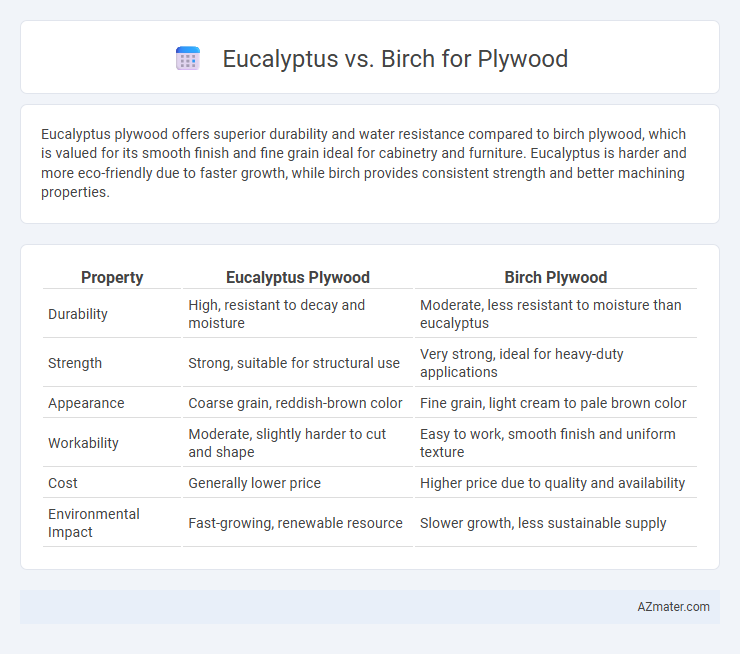Eucalyptus plywood offers superior durability and water resistance compared to birch plywood, which is valued for its smooth finish and fine grain ideal for cabinetry and furniture. Eucalyptus is harder and more eco-friendly due to faster growth, while birch provides consistent strength and better machining properties.
Table of Comparison
| Property | Eucalyptus Plywood | Birch Plywood |
|---|---|---|
| Durability | High, resistant to decay and moisture | Moderate, less resistant to moisture than eucalyptus |
| Strength | Strong, suitable for structural use | Very strong, ideal for heavy-duty applications |
| Appearance | Coarse grain, reddish-brown color | Fine grain, light cream to pale brown color |
| Workability | Moderate, slightly harder to cut and shape | Easy to work, smooth finish and uniform texture |
| Cost | Generally lower price | Higher price due to quality and availability |
| Environmental Impact | Fast-growing, renewable resource | Slower growth, less sustainable supply |
Introduction to Eucalyptus and Birch Plywood
Eucalyptus plywood offers exceptional durability and moisture resistance, making it ideal for outdoor and heavy-duty construction projects. Birch plywood is known for its smooth surface, fine grain, and dimensional stability, preferred in furniture making and interior applications. Both species provide strong, versatile plywood options, but eucalyptus excels in strength while birch delivers superior finishing qualities.
Botanical Differences Between Eucalyptus and Birch
Eucalyptus plywood originates from fast-growing hardwood trees in the Myrtaceae family, predominantly found in Australia, with a dense, porous grain structure and natural oils providing resistance to decay and insects. Birch plywood comes from Betula species in the Betulaceae family, mainly in the Northern Hemisphere, featuring a fine, even grain with a pale color and high bending strength. These botanical differences influence the wood's density, durability, and appearance, impacting their suitability for various plywood applications.
Wood Characteristics: Density, Strength, and Grain
Eucalyptus plywood features a high density ranging from 700 to 900 kg/m3, offering superior strength and durability compared to birch plywood, which has a lower density of around 600 to 700 kg/m3. The grain of eucalyptus is typically interlocked and coarse, providing enhanced resistance to wear and impact, while birch exhibits a fine, uniform grain contributing to smooth finishing and consistent plywood performance. These wood characteristics make eucalyptus ideal for heavy-duty structural applications, whereas birch is preferred for furniture and interior paneling due to its workability and aesthetic appeal.
Plywood Manufacturing Process: Eucalyptus vs Birch
The plywood manufacturing process for eucalyptus involves fast-growing hardwood species with dense, durable veneers, resulting in strong, moisture-resistant sheets suitable for structural applications. Birch plywood production uses fine-grained hardwood with uniform texture, creating smooth, stable panels favored for furniture and interior design due to their aesthetic finish. Both eucalyptus and birch undergo rotary peeling, drying, gluing, and pressing, but eucalyptus veneers typically require higher temperature and pressure to achieve optimal bonding strength.
Durability and Moisture Resistance Comparison
Eucalyptus plywood exhibits superior durability due to its dense hardwood composition, providing enhanced resistance to wear and impact compared to birch plywood. Moisture resistance in eucalyptus plywood is significantly higher because its natural oils reduce water absorption, making it more suitable for humid environments. In contrast, birch plywood, while strong and visually appealing, tends to absorb moisture more readily and can delaminate or warp if not properly sealed and maintained.
Environmental Impact and Sustainability
Eucalyptus plywood offers rapid growth and high yield, making it a renewable resource with lower carbon footprints compared to birch, which grows slower and requires more energy-intensive harvesting. Birch plywood, while durable and strong, often relies on older-growth forests, posing challenges for sustainable sourcing and biodiversity. Choosing eucalyptus plywood supports sustainable forestry practices and carbon sequestration, enhancing its environmental advantages over birch in plywood production.
Cost and Market Availability
Eucalyptus plywood generally offers a lower cost compared to birch plywood due to faster growth rates and wider plantation availability, making it a budget-friendly choice for large-scale projects. Birch plywood is often priced higher because of its superior strength, smooth finish, and limited supply, which appeals to premium markets requiring durability and aesthetics. Market availability of eucalyptus plywood is more consistent in regions like Australia and parts of Asia, whereas birch plywood is predominantly sourced from northern Europe and North America, influencing regional price variations.
Common Applications of Eucalyptus and Birch Plywood
Eucalyptus plywood is widely used in construction, furniture making, and interior design due to its strength, durability, and resistance to moisture, making it ideal for flooring, wall panels, and cabinetry. Birch plywood is favored for high-quality furniture, cabinetry, and decorative veneers because of its smooth grain, stability, and excellent paint adhesion. Both Eucalyptus and Birch plywood are popular in applications requiring strong, aesthetically pleasing wood products but differ in cost and appearance preferences.
Pros and Cons of Eucalyptus Plywood
Eucalyptus plywood offers high durability, rapid growth rates, and cost-effectiveness, making it a sustainable option for construction and furniture applications. However, its higher moisture content can lead to potential warping and requires thorough treatment for water resistance compared to birch plywood. Birch plywood is known for its smooth finish and strength, but eucalyptus's eco-friendliness and availability provide competitive advantages despite some susceptibility to environmental damage.
Pros and Cons of Birch Plywood
Birch plywood is renowned for its fine grain, uniform texture, and durability, making it an excellent choice for cabinetry, furniture, and indoor applications where strength and aesthetics matter. Its stable structure resists warping and dents better than many hardwood alternatives, providing a smooth finish ideal for painting or staining. However, birch plywood tends to be more expensive and less readily available than eucalyptus plywood, which is generally more affordable and faster-growing but softer and less resistant to moisture.

Infographic: Eucalyptus vs Birch for Plywood
 azmater.com
azmater.com